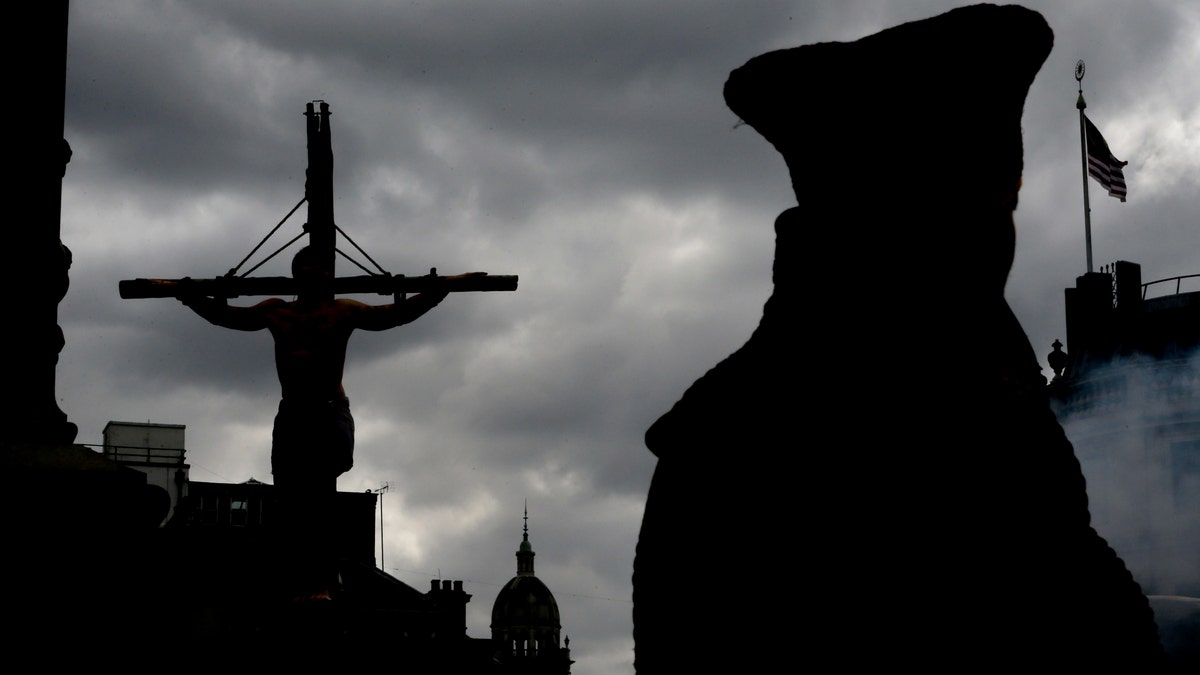
An actor is silhouetted hanging on a cross during a performance in Trafalgar Square in London, Friday, April 18, 2014. The play called 'The Passion of Jesus' was a free performance depicting the betrayal, capture, trial, crucifixion and resurrection of Jesus, performed by the Wintershall players. (AP Photo/Kirsty Wigglesworth) (AP2014)
As a Catholic bishop who regularly engages skeptics, I’m often asked: If Jesus is the son of God, the savior, risen from the dead, why is the world still in such a mess?
Not long ago, I was involved in a Jewish-Catholic dialogue, and one of my Jewish conversation partners said: “From our perspective, Jesus cannot be the Messiah, because when the Messiah announced by the prophets comes, he is supposed to bring forth universal justice and peace. Since this obviously hasn’t happened, Jesus can’t be the one.”
These are good and fair challenges to Christian belief. Almost everyone thinks that Jesus was a compelling moral teacher. But at the end of the day, he hasn’t seemed to have had much of a real impact on problems that afflict our world – especially in times of political strife, natural disasters and other suffering.
In my new book, “To Light a Fire on the Earth: Proclaiming the Gospel in a Secular Age,” written with journalist John L. Allen, Jr., I consider this question.
The Roman cross – as apt a symbol of cruelty, corruption, violence and death as one could imagine – was meant to terrify everyone. But the first followers of Jesus saw it as a sign that the definitive battle had been won.
To understand why the world remains plagued with problems, let’s look at an analogy drawn from military history. After D-Day and the Normandy invasions in France, World War II in Europe was over for all practical purposes. Sensible people on both the German and Allied sides understood this.
Nevertheless, there was still an awful lot of work to be done, many more battles to be fought and much more blood to be shed before the final Nazi surrender.
Something similar is true in regard to Jesus. On a terrible instrument of torture on a squalid hill outside Jerusalem, the son of God took upon himself cruelty, hatred, violence, stupidity and institutional injustice – indeed, all the permutations and combinations of human dysfunction.
And Jesus swallowed them all up in the divine forgiveness saying: “Father, forgive them, for they know not what they do.” The ultimate enemy he struggled with that awful day was death itself. Jesus willingly succumbed to that power – a power that haunts every person on this planet, negatively conditions all that we think or achieve, and threatens every one of our relationships.
If Jesus had died on that cross and simply remained in his grave, he might be remembered by a few people as a hero from a distant time. But at the heart of the Christian faith is the claim that Jesus in fact – through the Holy Spirit – rose from death and thereby demonstrated that God’s love is more powerful than anything that is in the world. More powerful than hatred and injustice, and more powerful even than death.
And this is precisely why the first Christians held the cross of Jesus up as a kind of taunt. The Roman cross – as apt a symbol of cruelty, corruption, violence and death as one could imagine – was meant to terrify everyone. But the first followers of Jesus saw it as a sign that the definitive battle had been won.
Did the world become perfect overnight? Of course not. But the back of the enemy had been broken. And therefore, the most extravagant hope is justified. In point of fact, the disciples of the risen Lord are given the privilege of gathering under his banner and joining him in the fight that remains.








































